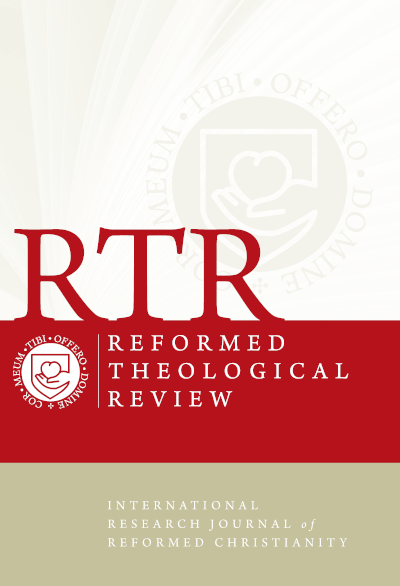Nineteenth-Century Free Church Apologetics Reconsidered
Main Article Content
Abstract
This article argues that the negative influence of Common-Sense Realism on Scottish Free Church evidentialist apologetics has been exaggerated. Mainstream scholarship claims that many nineteenth-century Presbyterian evidentialists, having uncritically imbibed Common-Sense philosophy, overemphasised natural reason’s role in evangelisation. In recent years, some scholars have argued that this interpretation does not apply to Old Princeton, since its major figures taught that to reason rightly requires moral renewal, which only the Holy Spirit can provide. This article shows that the same analysis holds true for the Scottish Free Church tradition. It uses James MacGregor’s trilogy of apologetics as a case study.
Article Details
The Author/s grant/s to the Journal the rights to edit the Work and to reproduce and distribute the Work in the Journal, in reprints, as a contribution to a collection published by the Journal, and by means of an Internet or Intranet site over which the Journal exercises effective control, and also by means of third-party online legal information providers. The Author/s grant/s the above rights without claim of royalties or other compensation. The copyright in the Work shall remain with the Author/s and the copyright in the reproduction format shall remain with the Journal. Notwithstanding, the copyright notice in publication shall be stated as belonging to the Journal. The Author/s agree/s not to publish the Work elsewhere without the permission of the Journal for a period of five years commencing from the date of first publication by the Journal.
References
Alhstrom, Sydney H., ‘The Scottish Philosophy and American Theology’, Church History 24, no. 3 (1955), 257–272 DOI: https://doi.org/10.2307/3162115
Breward, Ian, ‘1871–1901: Clamant Needs, Determined Battlers’, in Presbyterians in Aotearoa: 1840–1990, ed. Dennis McEldowney (Wellington: Presbyterian Church of New Zealand, 1990), 43–73.
———, ‘Lloyd Geering and James MacGregor: Two New Zealand Apologists’, in Faith in an Age of Turmoil: Essays in Honour of Lloyd Geering, ed. James Veitch (London: Oriental University Press, 1990), 190–202.
Cunningham, William, Theological Lectures; On Subjects Connected with Natural Theology, Evidences of Christianity, the Canon and Inspiration of Scripture (London: James Nisbet, 1878).
Helm, Paul, John Calvin’s Ideas (Oxford: OUP, 2004). DOI: https://doi.org/10.1093/0199255695.001.0001
Helseth, Paul Kjoss, ‘Right Reason’ and the Princeton Mind: An Unorthodox Proposal (Phillipsburg, NJ: P&R, 2010).
Hicks, Peter, The Philosophy of Charles Hodge: A 19th Century Evangelical Approach to Reason, Knowledge and Truth (Lewiston/Queenston/Lampeter: Edwin Mellen, 1997).
Hodge, Charles, ‘Regeneration, and the Manner of its Occurrence’, Biblical Repertory and Theological Review 2, no. 2 (1830), 250–297.
———, Systematic Theology, vol. 2 (New York: Charles Scribner, 1872).
Hoffecker, W. Andrew, Piety and the Princeton Theologians: Archibald Alexander, Charles Hodge, and Benjamin Warfield (Phillipsburg, NJ: P&R, 1981).
Holmes, Martin George, ‘Assessing the First World War’s Impact on Scottish Presbyterianism in the Diaspora: The Case of the Presbyterian Church of New Zealand’, Scottish Church History 52, no. 2 (2023), 131–154. DOI: https://doi.org/10.3366/sch.2023.0103
Keddie, John W., James MacGregor: Preacher, Theologian and Defender of the Faith (JWK Books, 2016).
MacGregor, James, Studies in the History of Christian Apologetics: New Testament and Post-Apostolic (Edinburgh: T&T Clark, 1894).
———, The Apology of the Christian Religion: Historically Regarded with Reference to Supernatural Revelation and Redemption (Edinburgh: T&T Clark, 1891).
———, The Revelation and the Record: Essays on Matters of Previous Question in the Proof of Christianity (Edinburgh: T&T Clark, 1893).
MacLeod, Donald, ‘Bavinck’s Prolegomena: Fresh Light on Amsterdam, Old Princeton, and Cornelius Van Til’, Westminster Theological Journal 68 (2006), 261–282.
Matheson, Peter, ‘The Reception of Calvin and Calvinism in New Zealand: A Preliminary Trawl’, in Calvin: The Man and the Legacy, eds. Murray Rae, Peter Matheson and Brett Knowles (Adelaide: ATF Theology, 2014), 171–188. DOI: https://doi.org/10.2307/j.ctt163t9d3.12
Moss, Candida R., The Myth of Persecution: How Early Christians Invented a Story of Martyrdom (New York: HarperOne, 2013).
Noll, Mark A., ed., The Princeton Theology, 1812–1921: Scripture, Science, and Theological Method from Archibald Alexander to Benjamin Warfield (Grand Rapids, Baker, 2001).
Riddlebarger, Kim, The Lion of Princeton: B. B. Warfield as Apologist and Theologian (Bellingham, WA: Lexham, 2015).
Rogers, Jack and Donald McKim, The Authority and Interpretation of the Bible (San Francisco: Harper and Row, 1979).
Smith, David P., B. B. Warfield’s Scientifically Constructive Theological Scholarship, ed. June Corduan (Eugene, OR: Pickwick, 2011),
Van Til, Cornelius, The Defense of the Faith (Chicago: Barakaldo Books, 2020),
Wagenman, Michael, ‘Abraham Kuyper on Apologetics’, Journal for Christian Scholarship 57, no. 1 (2021), 1–18.
Warfield, Benjamin Breckinridge, Calvin and Calvinism (New York: OUP, 1931).
———, ‘Heresy and Concession’, in Selected Shorter Writings of Benjamin B. Warfield, vol. 1, ed. John E. Meeter (Nutley, NJ: P&R, 1973), 672–679.
———, ‘A Review of Herman Bavinck’s De Zekerheid des Geloofs’, in Selected Shorter Writings of Benjamin B. Warfield, vol. 2, ed. John E. Meeter (Nutley, NJ: P&R, 1973), 106–123.

